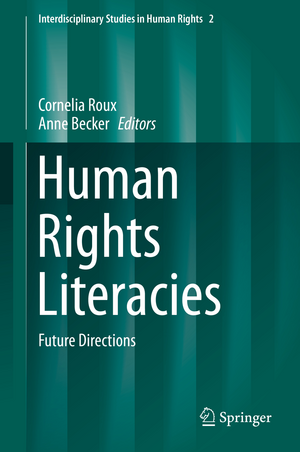Human Rights Literacies: Future Directions: Interdisciplinary Studies in Human Rights, cartea 2
Editat de Cornelia Roux, Anne Beckeren Limba Engleză Hardback – 14 ian 2019
This book adds impetus to the nexus between human rights, human rights education and material reality. The dissonance between these aspects is of growing concern for most human rights educators in various social contexts. The first part of the book opens up new discourses and presents new ontologies and epistemologies from scholars in human rights, human rights education and human rights literacies to critique and/or justify the understandings of human rights’ complex applications. Today’s rapidly changing social contexts and new languages attempting to understand ongoing dehumanization and violations, put enormous pressure on higher education, educators, individuals working in social sciences, policy makers and scholars engaged in curricula making.
The second part demonstrates how global interactions between citizens from different countries with diverse understandings of human rights (from developed and developing democracies) question the link between human rights andit’s in(ex)clusive Western philosophies. Continuing inhumane actions around the globe reflect the failure of human rights law and human rights education in schools, higher education and society at large. The book shows that human rights education is no longer a blueprint for understanding human rights and its universal or contextual values presented for multicomplexial societies. The final chapters argue for new ontologies and epistemologies of human rights, human rights education and human rights literacies to open-up difficult conversations and to give space to dissonant and disruptive discourses. The many opportunities for human rights education and literacies lies in these conversations.
Preț: 648.05 lei
Preț vechi: 762.42 lei
-15% Nou
Puncte Express: 972
Preț estimativ în valută:
124.02€ • 128.74$ • 103.41£
124.02€ • 128.74$ • 103.41£
Carte tipărită la comandă
Livrare economică 22 martie-05 aprilie
Preluare comenzi: 021 569.72.76
Specificații
ISBN-13: 9783319995663
ISBN-10: 3319995669
Pagini: 290
Ilustrații: XIX, 301 p. 9 illus.
Dimensiuni: 155 x 235 mm
Greutate: 0.63 kg
Ediția:1st ed. 2019
Editura: Springer International Publishing
Colecția Springer
Seria Interdisciplinary Studies in Human Rights
Locul publicării:Cham, Switzerland
ISBN-10: 3319995669
Pagini: 290
Ilustrații: XIX, 301 p. 9 illus.
Dimensiuni: 155 x 235 mm
Greutate: 0.63 kg
Ediția:1st ed. 2019
Editura: Springer International Publishing
Colecția Springer
Seria Interdisciplinary Studies in Human Rights
Locul publicării:Cham, Switzerland
Cuprins
Part I – Setting the Scene: The ‘Literacy Turn’ in Human Rights and Human Rights Education.- (Re)Framing the Subject(s) of Rights.- Unconditionally Human? Decolonising Human Rights.- Human Rights Literacies Research: (Re)think Approaches and Methodologies.- Part II – Possibilities and Probabilities: Subjects and Failed Subjects in Place-Space-Time: The Quest for Meaning.- Student Teachers Coping with Changing Times: The Intersection of Student-Teachers’ Understanding of Human Rights Issues and Their Cultural Identity.- More than Education: Reflections on Student Teachers’ Understanding of Human Rights.- Human Rights Education in South African Higher Education Context: (Im)Possibilities of Human Rights Literacies.- Israeli Students’ Understandings of and Attitudes to Human Rights Literacies.- Sectarian Violence and Ethnic Conflict in India: Issues and Challenges.- Part III – Unpacking Future Directions: Critiques and Conversations: Human Rights RIP: Human Rights Literacies-Critique and Possibilities.- (Re)Capturing Human Rights Literacies: Starting Conversations.
Textul de pe ultima copertă
This book adds impetus to the nexus between human rights, human rights education and material reality. The dissonance between these aspects is of growing concern for most human rights educators in various social contexts. The first part of the book opens up new discourses and presents new ontologies and epistemologies from scholars in human rights, human rights education and human rights literacies to critique and/or justify the understandings of human rights’ complex applications. Today’s rapidly changing social contexts and new languages attempting to understand ongoing dehumanization and violations, put enormous pressure on higher education, educators, individuals working in social sciences, policy makers and scholars engaged in curricula making.
The second part demonstrates how global interactions between citizens from different countries with diverse understandings of human rights (from developed and developing democracies) question the link between human rights andit’s in(ex)clusive Western philosophies. Continuing inhumane actions around the globe reflect the failure of human rights law and human rights education in schools, higher education and society at large. The book shows that human rights education is no longer a blueprint for understanding human rights and its universal or contextual values presented for multicomplexial societies. The final chapters argue for new ontologies and epistemologies of human rights, human rights education and human rights literacies to open-up difficult conversations and to give space to dissonant and disruptive discourses. The many opportunities for human rights education and literacies lies in these conversations.
Caracteristici
Analyzes why and how human rights education in many faceted and complex societies seems to lose the deep rooted aim of human rights Highlights the new directions and scholarly thoughts on basic human rights education programmes Presents empirical research (survey) from developed and developing democracies












